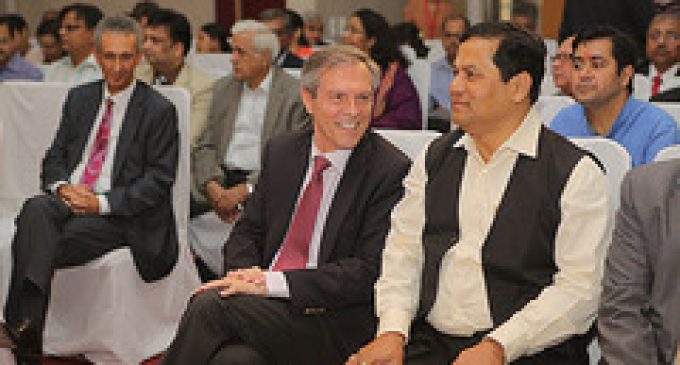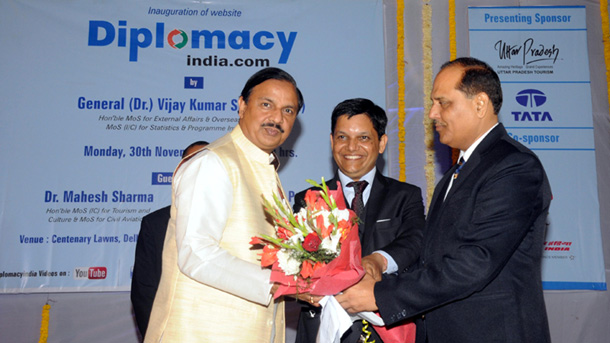

Ambassador Steiner with Minister Sonowal
New Delhi, October 08 : The German Embassy today organized a conference “Skilled Germany, Skilled India – The Dual System: State and Business” in keeping with Prime Minister Narendra Modi’s emphasis on Skill India and the concept of Make in India to enable the country to raise its manufacturing capabilities to atleast 25% of GDP from the existing 16% of GDP.
India’s economic strength has mainly come from the services sector such as IT enabled services in the last several years but left the manufacturing sector rather weak.
The conference helps deepen the Indo-German cooperation in the field of Vocational Education and Training (VET), a system so well perfected by Germany that it has produced the necessary skilled manpower for its manufacturing industry, to make it a major manufacturing and valuable hub for the world.
The conference was organized by the German Embassy, along with the Indian Ministry of Labour and Employment and the German Federal Ministry for Education and Research.
The conference follows as a logical sequence of a phone conversation in July this year between German Chancellor Angela Merkel and Prime Minister Narendra Modi where it was emphasized that Germany and India were natural partners in the field of Vocational Education and Training (VET). This gave fresh impetus to Indo-German cooperation in this highly relevant area.
Opening the conference , The German Ambassador Michael Steiner said, “Today’s conference is about the most important treasure we have: it is about our youth, in India and Germany; it is about their education and their future. VET is perhaps the most underestimated source of prosperity. Its importance goes far beyond its economic relevance – which of course is tremendous!”
Sarbananda Sonowal, Indian Minister of State for Sports & Youth Affairs, Skill Development & Entrepreneurship, was the chief guest at the conference.
The government is well into the process of revising the National Policy on Skill Development, 2009, to make it more result-oriented, Sonowal said here Wednesday, while inviting Germany’s involvement in the process.
“The revised policy will also endeavour to establish the international equivalent of Indian framework on skill development with the European framework. This will facilitate mobility of workforce,” Sonowal said adding skill development is a focus area of the National Democratic Alliance government with Prime Minister Narendra Modi creating a new ministry to handle the subject.
Modi had in his Independence Day speech announced the “Make in India” campaign inviting companies across the world to make their products in India and create jobs in the labour-intensive manufacturing sectors. The policy is being revised so that schemes of different ministries and portions of the Rs.10,000 crore earmarked to encourage entrepreneurship are routed through the newly-formed skill development and entrepreneurship ministry.
He was joined by several other important Indian and German players in the field of Skill Development, such as Commerce Secretary Amitabh Kant, Industry Secretary Gauri Kumar, Skill Development & Entrepreneurship Secretary Sunil Kumar and Ms Kornelia Haugg, Deputy-State Secretary, German Federal Ministry of Education and Research.
The conference’s goal was to show and discuss the advantages of the dual German System and to address the relevant questions for realizing the Indian Government’s priority goal “Skill India”: How to realize effective cooperation between state authorities and private companies? What are the models, instruments, and experiences? How can a work-based dual apprenticeship system, create state-of-the art, market-oriented and demand-driven vocational education for the Indian youth?
The conference helps to pave way for the 7th meeting of the Indo-German Joint Working Group on 9th and 10th October in New Delhi.
Every year, 12 million young Indians enter the labour market striving to make a living and to contribute to the development of their country. In developing and boosting its own skills mission, India can draw on Germany’s decades of experience. Germany is the world champion in bridging the gap between school and the labour market with its acclaimed system of dual vocational training. This system – the bedrock of Germany’s economic success – is based on a close partnership between government and businesses.
The idea is simple and cost-effective: Each trainee spends 3-4 days a week in a company, which provides practical training on the job and pays an apprenticeship salary. Another 1-2 days a week are dedicated to the complementary theoretical education at a public vocational school.
This benefits both sides: Young Germans receive a state-of-the-art, market-oriented and demand-driven education. Their employability is exceptionally high. The industry – in cooperation with the state – creates its own pool of productive, competitive and highly-motivated skilled labour.
Ambassador Steiner concluded by saying: “We organized this conference in order to have a frank dialogue. No dual approach is possible without courageous policy choices. These might be difficult, but they are necessary for our most valuable treasure, the youth. It’s about empowerment. To give the young generation the necessary tools for their future.”



